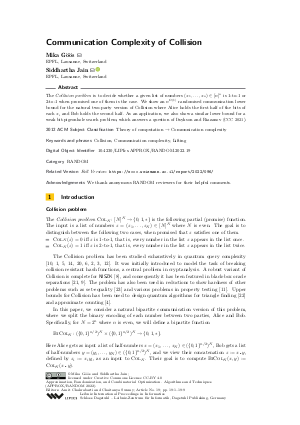@InProceedings{goos_et_al:LIPIcs.APPROX/RANDOM.2022.19,
author = {G\"{o}\"{o}s, Mika and Jain, Siddhartha},
title = {{Communication Complexity of Collision}},
booktitle = {Approximation, Randomization, and Combinatorial Optimization. Algorithms and Techniques (APPROX/RANDOM 2022)},
pages = {19:1--19:9},
series = {Leibniz International Proceedings in Informatics (LIPIcs)},
ISBN = {978-3-95977-249-5},
ISSN = {1868-8969},
year = {2022},
volume = {245},
editor = {Chakrabarti, Amit and Swamy, Chaitanya},
publisher = {Schloss Dagstuhl -- Leibniz-Zentrum f{\"u}r Informatik},
address = {Dagstuhl, Germany},
URL = {https://drops.dagstuhl.de/entities/document/10.4230/LIPIcs.APPROX/RANDOM.2022.19},
URN = {urn:nbn:de:0030-drops-171415},
doi = {10.4230/LIPIcs.APPROX/RANDOM.2022.19},
annote = {Keywords: Collision, Communication complexity, Lifting}
}

 Creative Commons Attribution 4.0 International license
Creative Commons Attribution 4.0 International license

